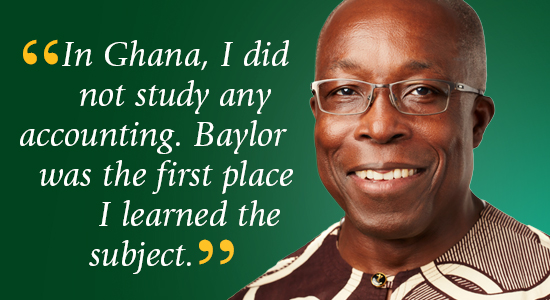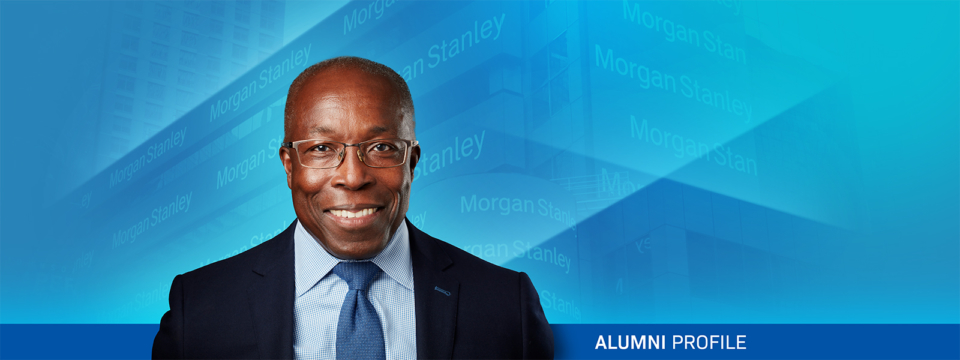Eric Offei-Addo has faced many challenges in life, always comes out with a new lesson learned.
Sometimes we prepare for the worst yet nothing ends up happening. Other times we are ill-prepared for when disaster strikes and end up lost or starting over from scratch.
If you ask Eric Offei-Addo—who has navigated coup d’états, 9/11 and now Covid-19—those previous preparations are likely useful beyond its intended purposes.
Offei-Addo was born and raised in Ghana, a West African country known for its gold, cocoa and oil. His parents were both educators, his mother was an elementary school teacher and father was a Presbyterian minister, which led his family to move around to different congregations.
Religion was a significant aspect of his family, and it quickly became important to Offei-Addo, as well.
After finishing secondary school, Offei-Addo enrolled at the University of Ghana where he studied Economics. In 1982, while still attending the university, a coup d’état occurred within Ghana’s government.
“When the government was overthrown, students were asked to do voluntary work around the country,” Offei-Addo said.
“I was not amused by the unnecessary interruption of our education and academic year, notably given the high unemployment rate and numerous unoccupied hands who could just have been gainfully employed to perform such tasks, yet I was lucky.”

New York City, New York.
Offei-Addo was granted an internship opportunity in the Netherlands, working at Algemene Bank Nederland. He was there for roughly a year before returning for his final semester in Ghana.
Once he graduated, he was required to complete his national service. His professor requested he join him at the Ghana Commercial Bank, working in the Economics Intelligence Department.
One of Offei-Addo’s responsibilities there was contributing to a monthly economic bulletin. He was tasked with showcasing the profitability of the timber industry, one of the leading agricultural commodities in Ghana.
The report ended up being a success, even being included in a magazine and part of the promotional material at Ghana’s first trade fair for lumber products and exhibition for the Furniture and Woodworking Industry, GIFEX ’85.
This led Offei-Addo to consider graduate school to further his knowledge. He sent in applications to schools across England and the United States, eventually landing at Baylor University. He enrolled in the MBA program at Baylor, where he soon met a professor who truly understood his learning style.
“In Ghana, I did not study any accounting,” he said. “Baylor was the first place I learned the subject. There was a professor who explained it in a very easy manner and I really enjoyed it.”
The professor, Becky Jones, used cooking references to explain accounting principles. Offei-Addo loves cooking, so this style of teaching was extremely easy to learn from, he said.
After he earned his MBA in 1989, he moved to the Northeast where he served as a bank examiner for the State of Connecticut Department of Banking.
Despite working full time, Offei-Addo continued studying accounting on the side, eventually passing the CPA exam.
As he grew in his career, Offei-Addo noticed how a majority of his work intersected with legal practices. He soon decided to go back to school, but this time, he enrolled at Cornell University’s Law School. When he graduated with his JD in 2000, he went to work for the Brown and Wood law firm in New York City.
His office was located in Tower One of the World Trade Center.
Offei-Addo returned from a trip home to Ghana in the early part of September 2001. On Sept. 10, he worked late into the evening in order to meet a deadline.
While he did not finish, he decided to retire to his apartment across the river in Brooklyn and would return early the next morning to finalize the drafts.
Fortunately for him, jetlag set it. Offei-Addo awoke at about 3 a.m. on Sept. 11, unable to fall asleep for several hours and eventually sleeping through his alarms. He awoke to several phone calls from coworkers asking if he had heard what happened.
“We initially thought it was a helicopter accident, which was not surprising given the regular fly-by of news choppers,” he said. “It was not until my family called me from Ghana to check on me that I realized the severity.”
Within minutes, the second plane hit. It was not long before the towers fell.
Work, much like everything else those days, was uncertain. All of the firm’s material records were lost in the attacks, as was the case for many companies.
Offei-Addo returned to work a few weeks later, this time for Sidney Austin LLP, who had been in the process of merging with Brown and Wood prior to the attacks.
His first day back, Offei-Addo was hit with a surprise. Each of his colleagues was handed a CD containing every email and computer file they ever had sent or created at Brown and Wood. But how?
“Y2K,” Offei-Addo said. “It was supposed to be the end of the business world as we knew it. Turns out it saved it.”
In preparation for Y2K, the U.S. government and business invested roughly $50 billion in systems to protect against the potential problems anticipated due to the pre-millennium practice of using two digits to designate a year.
One of the safeguarding protocols implemented at the company included computers being backed up every 15 minutes to a server, typically in a different region of the county, Offei-Addo said.
This safeguard for an event that never happened ended up saving the business nearly two years later.
It is this type of unplanned innovation that Offei-Addo sees being implemented now during the COVID-19 pandemic.
We used to yell at our son for playing video games all the time. He would sit there for hours chatting with people from all over,” he said.
“But while we were yelling, someone else saw an opportunity to connect people from around the world in real-time. Zoom, Skype and most of the virtual-meeting sites were all developed well before Covid.
And now they are being utilized in ways we never dreamt of for business, church, friends and family meetings.”
Now an executive director at Morgan Stanley, Offei-Addo relies on technologies not designed for their current use to do his job. He never imagined meeting with clients virtually would be the norm, but he is thankful it is possible.
The thought behind these advancements was not to be life-changing, yet they ended up being. The advancements were full of creativity, opportunity and ingenuity, all things he sees happening at Baylor and the Hankamer School of Business.
This is one of the reasons he continues to give back to the University in many ways, most recently agreeing to serve on the Hankamer School of Business Dean’s Advisory Board.
He believes the next unplanned innovation is being created right in Waco.
“Places like Baylor and Hankamer would have to help people to think through these kinds of changes,” he said.
“Just like people prepared for Y2K and it helped with 9/11. Hankamer is perfectly set up to prepare for something that could and would one day come.”
Latest Stories
-
Dr. Ekua Ekumah highlights how to cultivate new theatre audience
53 seconds -
Zambian FA president charged with money laundering
19 mins -
Mysstel releases video for ‘Paradise’
22 mins -
We are yet to receive an apology from Ashanti Regional Minister – ECG
24 mins -
UEFA International Tournament: Ernest Ofori scores for Black Starlets in defeat to Russia
31 mins -
Cocoa price surge linked to production decline -COCOBOD CEO
36 mins -
Atarah Praise returns on May 19 at Adenta Barrier
37 mins -
World Robotics Championship: 18 pre-tertiary students poised to win medals for Ghana at global competition
41 mins -
Drowned widow was scammed out of $1.5m on dating app hoax, left note about secret ‘double life’
1 hour -
ECG workers threaten to disconnect power from Ashanti Regional Minister’s home
1 hour -
Brain tumour shatters 20-year-old’s dream of becoming a doctor
1 hour -
ICDP Ghana introduces portable ultrasound machines in rural communities
1 hour -
Seven killed in sleep after Ethiopia building collapses
1 hour -
Fitch affirms ETI at B-; Outlook stable
3 hours -
Pictures: Bawumia meets Pope Francis
3 hours

